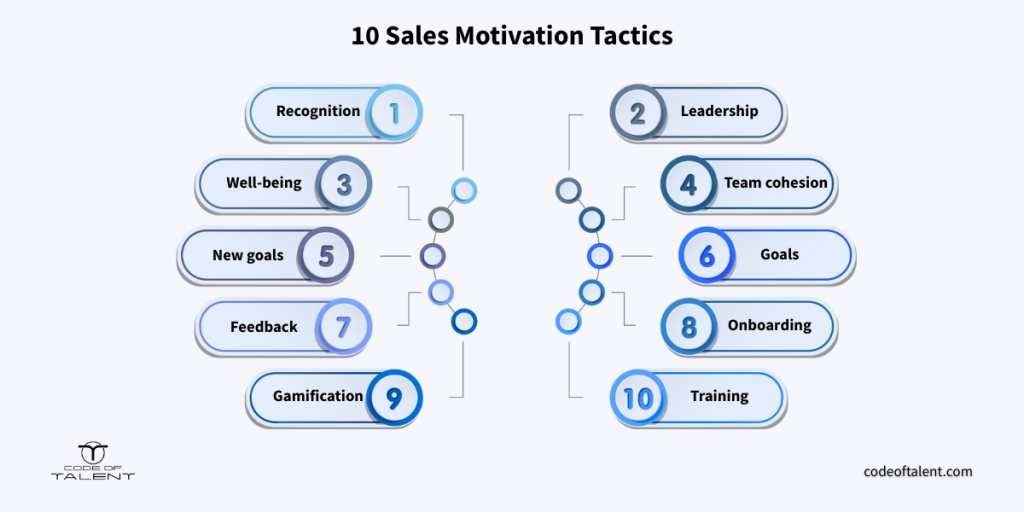In 2024, disengagement led to $438 billion in costs globally, according to Gallup. In sales, that disengagement often stems from a drop in motivation. Lost deals, burnout, lack of recognition, and toxic work environments all play a role. With so much at stake, it’s clear that how to motivate sales teams is something every company should be thinking about.

Why Are Sales Reps So Demotivated?
It’s a well-known fact that sales is a demanding industry. A Salesforce report reveals that 69% of sales professionals believe selling is harder than ever due to increased quotas, tighter budgets, new technologies, and supply chain chaos. At the same time, 89% of sellers report feeling burned out.
But the amount of work and stress are not the only reasons for demotivation. Reward Gateway found that employees feel most demotivated when:
- They believe their work goes unnoticed (43%)
- When they have a poor manager (43%)
- When recognition is lacking (40%)
These numbers confirm what many experts have long said: motivation isn’t only driven by extrinsic rewards, but by intrinsic factors too, like purpose, growth, and feeling valued. In fact, research from Baylor University shows the opposite: that internal motivation drives performance more than external rewards.
Benefits of Motivated Sales Teams
On the other side of the coin, motivated sales reps show a higher engagement and performance rate. Teams with high engagement see a 10% increase in customer ratings and an 18% boost in sales.
This connection between motivation and performance isn’t just theoretical. Research from Oxford University found that happy employees are 13% more productive than their peers. In sales, where every percent matters, that difference can reshape revenue projections.
Top Strategies on How To Motivate Sales Teams
Motivation comes in different forms: internal or external. Below there’s a list of comprehensive tactics to increase sales motivation for all budgets and team sizes.

1. Recognition, the Secret Weapon to Success
Beyond monetary gains, people want to feel valued. Recognition sits on the fourth level of Maslow’s Hierarchy of Needs in the “self-esteem” category. In the corporate world, it can shape the entire relationship between an employee and their employer. For example, a survey showed that 55% of employees would leave their job for one that appreciates their work more.
When recognition becomes part of the culture, the impact multiplies. According to Great Place to Work, employees who feel consistently appreciated are:
- 2.6x more likely to believe promotions are fair
- 2.2x more likely to suggest new ideas
- 2x more likely to go above and beyond
Here are some examples of recognitions that can motivate sales employees.
- Public: Shoutouts in team meetings, company-wide updates, newsletters, Slack channels, or on internal platforms
- Peer-to-Peer Recognition: According to SHRM and Globoforce, peer-to-peer recognition is 35.7% more likely to positively impact financial results than manager-only recognition
- Words of Affirmation: Surveys show that 32% of people prefer words of affirmation as their top form of appreciation. A personal thank-you email or handwritten note can bring a smile even to the most unmotivated
- Tangible Rewards: Gift cards, merchandise, or small bonuses for milestones
2. Prepare Sales Managers to Motivate Their Teams
Sales managers shape the everyday experiences of their teams and knowing how to motivate sales teams should be a top priority to them. Whether it’s support during a tough week or celebrating small wins, leadership habits and skills affect motivation more than many realize.
According to RAIN Group, 55% of top-performing sales organizations say their managers are good at sustaining team energy. In lower-performing companies, only 32% agree. It also matters how approachable managers are. When employees feel safe sharing concerns, they are 2.4 times more likely to stay engaged at work, according to Quantum Workplace.
Additionally, a Glassdoor survey found that 81% of employees are motivated to work harder when their boss shows appreciation. That’s more than double the number of people who are motivated by fear of job loss or pressure to perform.
3. Invest in Their Well-Being
Sales is an emotionally demanding job. The pressure to meet targets, deal with rejection, and stay constantly upbeat can take a toll. That’s why investing in the mental and physical well-being of your sales team has become a competitive advantage.
Small but meaningful initiatives can go a long way:
- Wellness bonuses like spa vouchers, paid gym memberships, or yoga sessions give reps a reason to decompress and recharge
- Therapist access through medical plans helps normalize mental health support
- Mental health breaks, such as one day a month that isn’t deducted from PTO, allow employees to reset without guilt
These practices show employees they’re more than just numbers on a spreadsheet and that their overall health matters. When people feel supported, they tend to show up more energized, focused, and ready to perform.
4. Strengthen Team Collaboration
Sales can feel isolating, especially in hybrid or remote settings. But strong team dynamics can completely shift the experience from draining to energizing. When people feel part of a group that supports each other, their motivation spikes.
Simple initiatives include:
- Team-building activities
- Team exercises and shared projects
- Brainstorming sessions
5. Rethink Goals
Setting goals may sound like basic management, but it’s a powerful tool for motivation, if done right. A McKinsey study found that 72% of employees cited goal setting as a strong motivator. To make goal setting meaningful:
- Rethink KPIs to include both short-term and long-term growth, not just quotas
- Personalize goals based on strengths, career ambitions, and past performance
- Link goals to real career advancement opportunities
Don’t think of goals as other numbers to track, but as tools to build confidence and help employees grow, both personally and professionally.
6. Offer New Challenges
Motivation fades when routines grow stale. Offering new challenges can bring a breath of fresh air to a rep who’s hit with burnout or boredom. Try:
- Assigning the rep to a new product, service, or client
- Creating chances for them to collaborate with other departments like marketing, product, or customer success on new projects
- Giving them more decision-making responsibilities like managing a project from start to finish
Exposing sales reps to new challenges or environments encourages them to adapt, think creatively, and step away from the usual frustrations or dead ends.
7. Gather Feedback
Motivation suffers when people feel like their input doesn’t matter. According to Forbes, when people feel like they are heard in the workplace, they’re 4.6 times more likely to bring their best to work. Regularly gathering feedback from your sales team about processes, tools, leadership, and team dynamics sends a clear message: we’re listening.
But feedback only drives motivation when it leads to visible change, such as:
- Tweaking an internal workflow
- Improving communication with management
- Updating outdated tools
- Adding benefits based on employees’ needs, complaints, or desires
8. Start With Better Onboarding
A sales rep’s motivation often depends on their very first days. A disorganized, rushed onboarding experience can plant seeds of confusion and disconnection. In contrast, a thoughtful, well-paced onboarding process helps new hires feel confident, clear, and part of the team.
Good onboarding should:
- Introduce reps to the company’s tools, systems, and culture
- Offer clear, engaging product training so they know exactly what they’re selling
- Develop soft skills to help them build strong client relationships from day one
- Set clear expectations and outline a structured ramp-up plan
When onboarding is done right, reps know what’s expected of them, which lowers the chances of early missteps or disappointment.
9. Gamify With Sales Contests and Leaderboards
Sales reps are competitive by nature, and a little gamification can turn routine targets into something exciting. Leaderboards and contests tap into this dynamic, encouraging reps to push a little harder and have fun while doing it.
Whether it’s a monthly “Top Closer” board, a limited-time bonus challenge, or a creative themed contest, gamification:
- Adds energy to the daily routine
- Encourages friendly rivalry
- Recognizes effort in real time
Just make sure the structure is fair and inclusive. Reward different types of wins, like most improved, best teamwork, or customer satisfaction, not just top revenue.
10. Offer Real Training Opportunities
The best reps are continually learning. Ongoing training opportunities help sales people develop new skills, stay on top of their game, and feel like the company is investing in their success.
Training for sales teams can take many forms:
- Sales workshops
- Product updates or demos
- Guest speakers or expert sessions
- Certifications or access to online courses
- Modern training modules like microlearning, gamification, or e-learning apps
When reps feel like they’re growing in their roles, they’re more likely to stay motivated and engaged, especially when training is practical and tied to their daily challenges.
Conclusion: Build Motivation Into the Way Your Team Works
The cost of disengagement is both financial and personal. Sales reps lose confidence. Teams fall apart. Companies stall. Learning how to motivate sales teams is how businesses protect their talent and performance.
Recognition, strong leadership, meaningful goals, and a supportive culture all play a role. Code of Talent makes it easier to put these into action. The platform helps companies develop their sales teams through short learning modules (no more than 10 minutes) that feel more like coaching than training. Because the content is interactive and bite-sized, reps stay engaged without feeling overwhelmed.
Some of Code of Talent’s features that support sales motivation include:
- Gamification elements like leaderboards, badges, and medals
- Product training tailored to a company’s materials, processes, and goals
- Customer-facing simulations and exercises, including storytelling, reflections, and interactive quizzes
- Soft skills development such as communication, teamwork, emotional intelligence, and problem-solving
- Collaborative, team-based activities that strengthen group dynamics and cohesion
- Ongoing feedback from mentors or managers to guide learning and improvement
- Real-time analytics on training progress, including completion rates and the quality of responses
This is what clients have to say about Code of Talent’s impact on their sales teams’ motivation and overall performance:

Try Code of Talent’s free trial on sales enablement now and see how to motivate sales teams efficiently and strategically!
Cover page: Freepik





